Learn how to make red bean bread like the ones from a Chinese bakery! The recipe uses an easy milk bread dough for a super soft and fluffy texture, and everything can be done with a mixer. {Vegetarian}
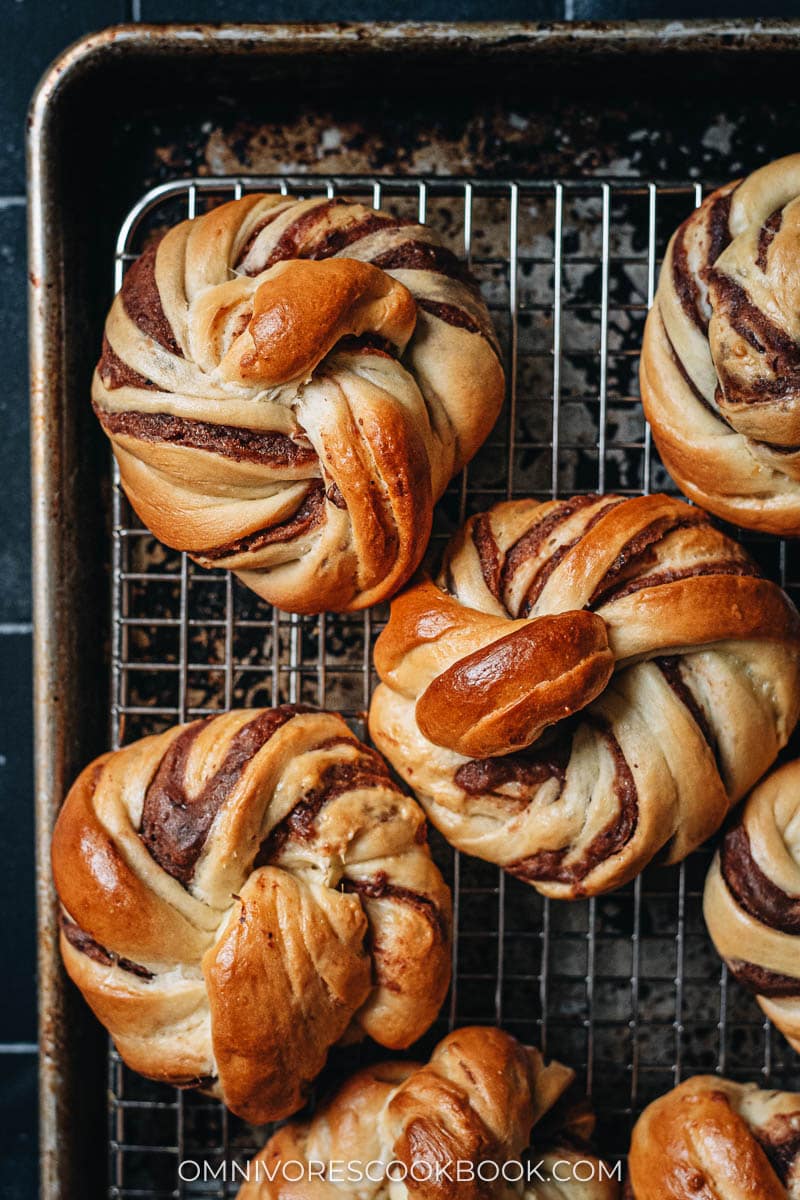
Baked red bean bread is a Chinese bakery classic. The bread is light, fluffy and slightly sweet. It is filled with creamy sweet red bean paste that pairs so well with a cup of tea for your breakfast or afternoon snack.
Making red bean bread is super easy. I want to share my easy milk bread dough. You can use a mixer to easily make the dough. This recipe shows you how to make beautiful swirl bread just like a professional bakery. But you can totally make the easier roll-style version with the red bean paste sealed inside.
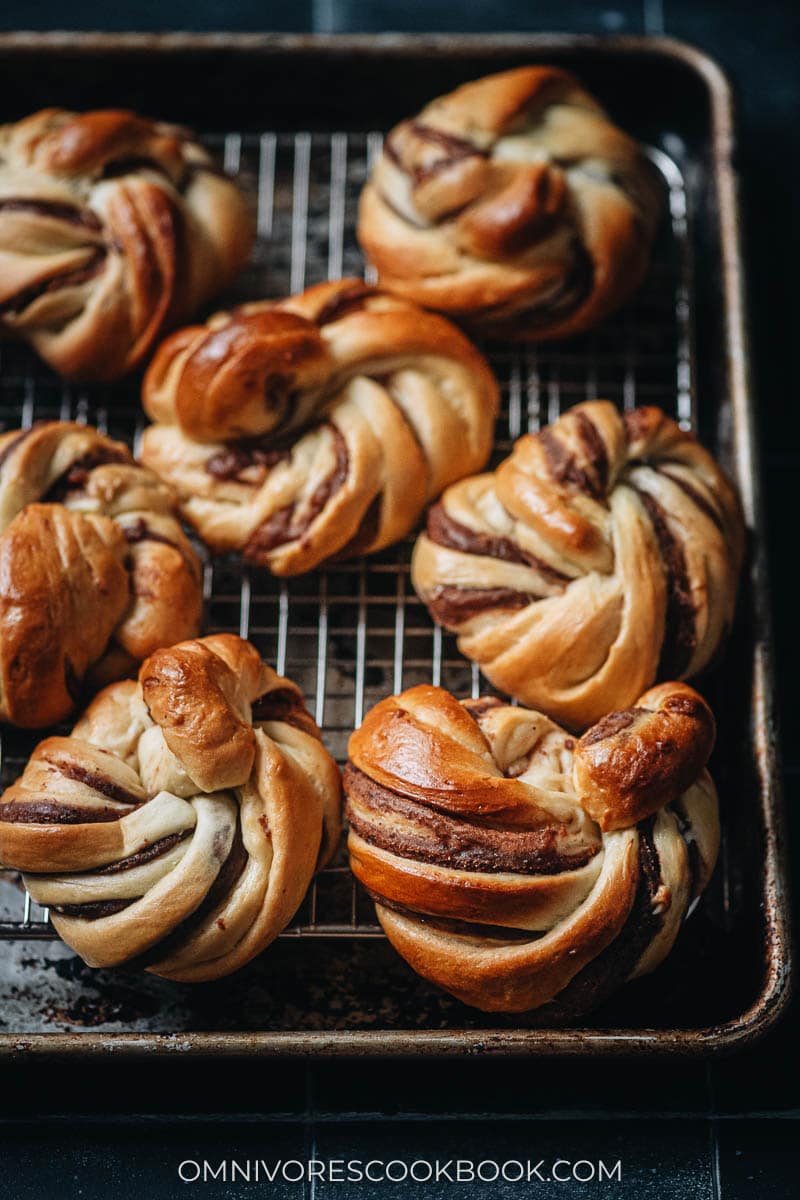
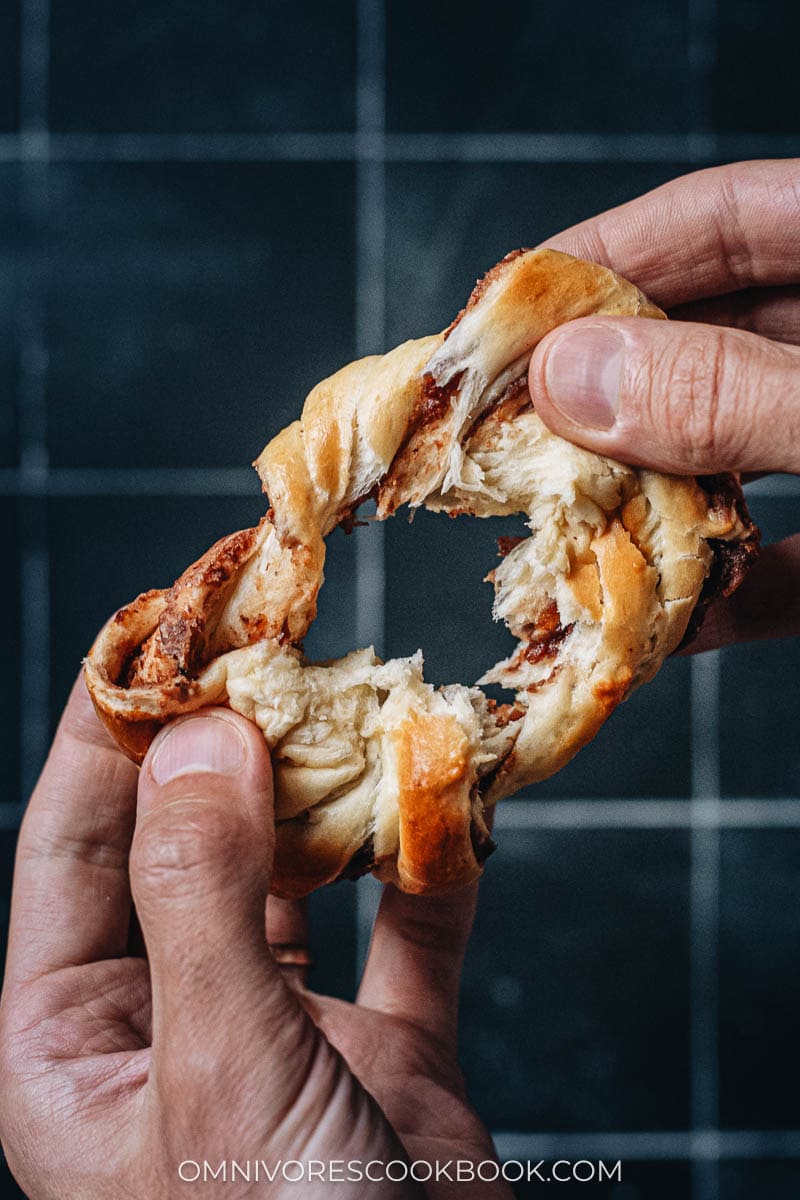
Red bean bread ingredients
Red bean paste
You can either use homemade red bean paste (I have a recipe here) or store bought red bean paste. I always prefer the homemade type because I can control the sweetness. But the store bought type would easily work as well.
When you purchase red bean paste, make sure the ingredients do not include maltose. The type that contains maltose is for making mooncakes. It is quite sticky and it is hard to work with when making red bean bread.
You can purchase red bean paste in most Asian grocery stores and on Amazon.
Mise en place
Here are the ingredients you need for making red bean bread:
- All-purpose flour
- Red bean paste
- Whole milk
- Condensed milk
- Sugar
- Salt
- Active dry yeast
- Egg
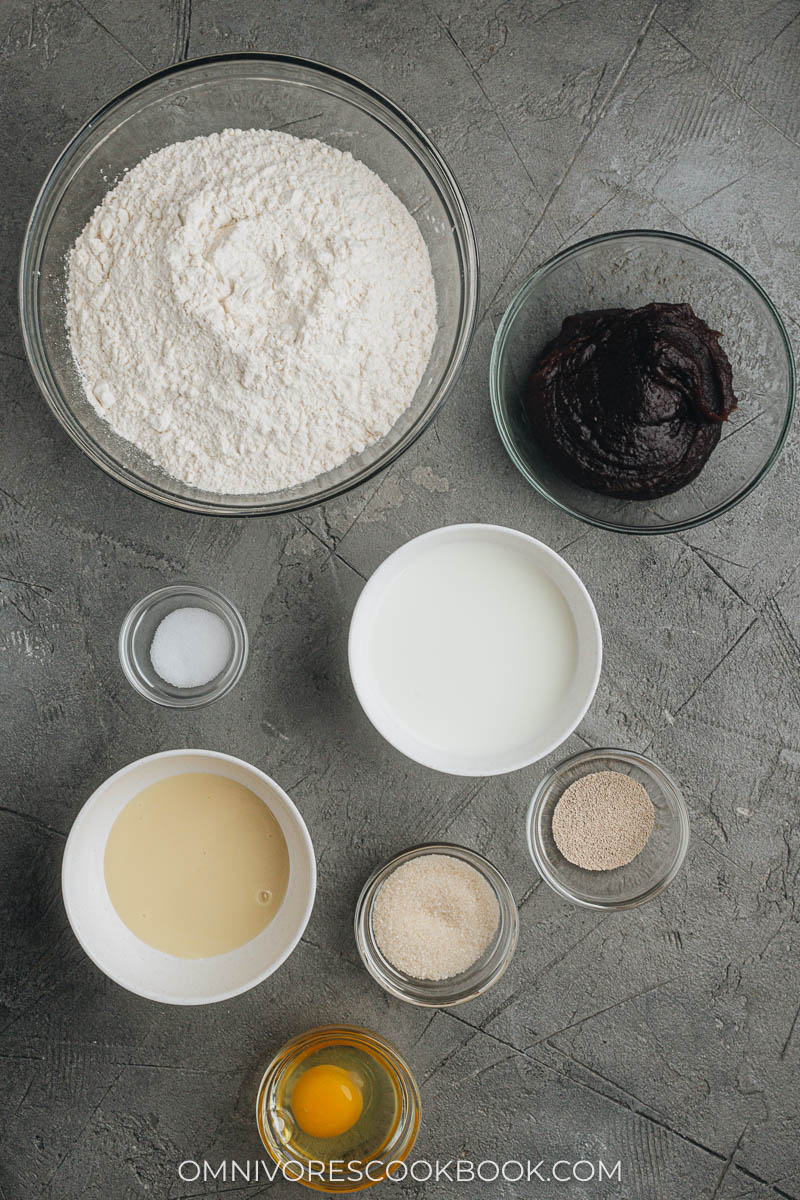
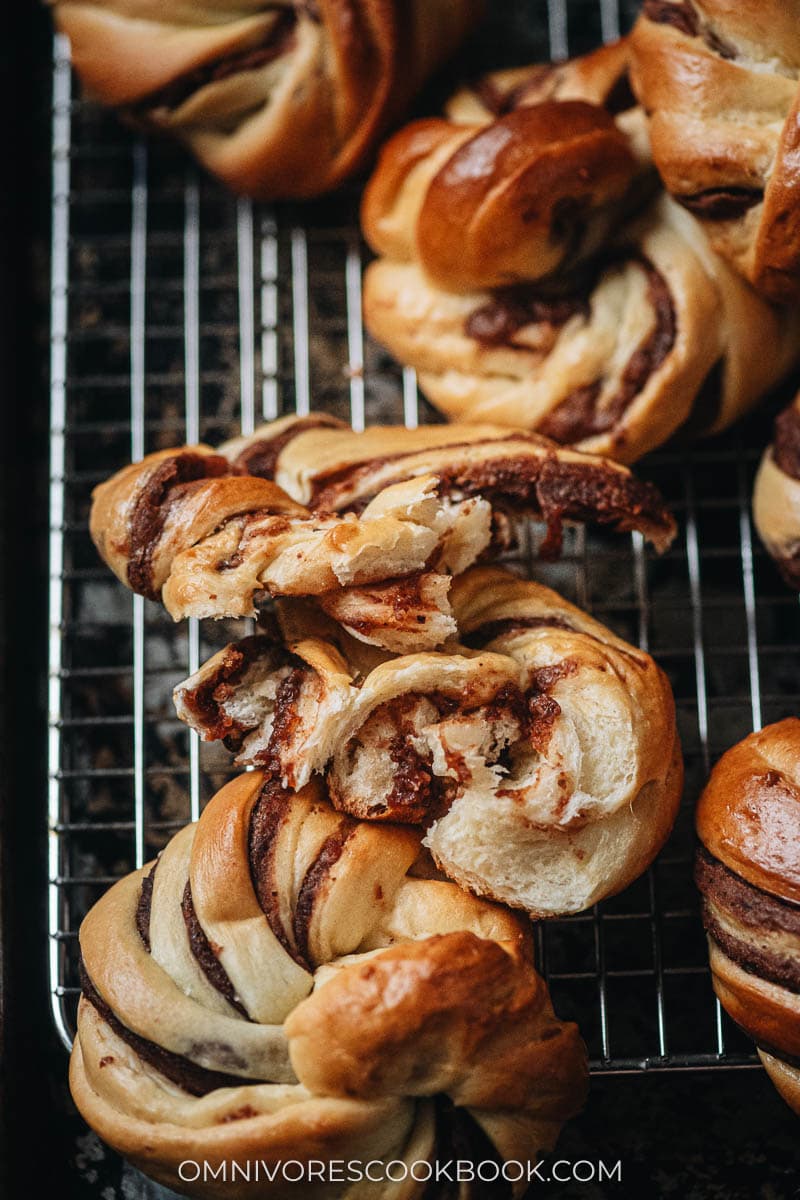
How to make red bean bread
Prepare the dough
- Combine the dry ingredients in a mixing bowl.
- Add the yeast into warm milk to activate it.
- Pour the milk with the yeast mixture into the dry ingredients. Add the rest of the wet ingredients.
- Mix everything together with a spatula.
- Knead in the mixer until dough forms.
- Shape the dough and let it rest until the size doubles.
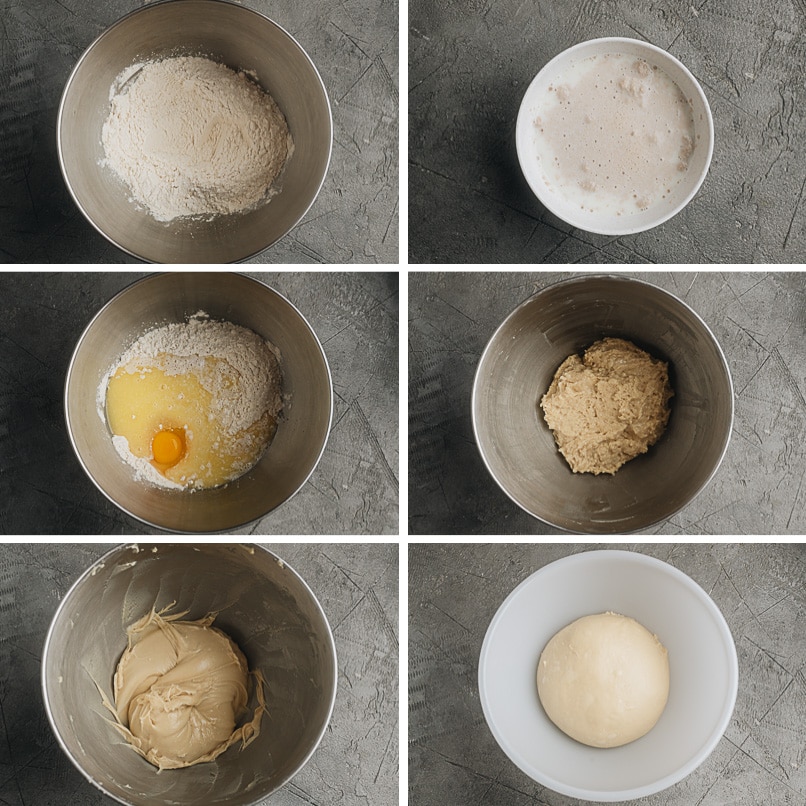
Assemble the red bean bread
- When the dough has doubled in size, punch it down. Divide the dough into 55-gram pieces.
- Roll each dough piece into a rectangle. Spread the red bean paste on top.
- Fold the rectangle lengthwise.
- Slice 5 evenly spaced slits with a sharp knife lengthwise.
- Stretch out the dough pieces.
- Twist the stretched dough.
- Wrap the twisted dough piece on the working surface into a coil.
- Tuck the end underneath to seal the bread.
This process might look a bit confusing at the beginning. But once you try it, it’s surprisingly straightforward.
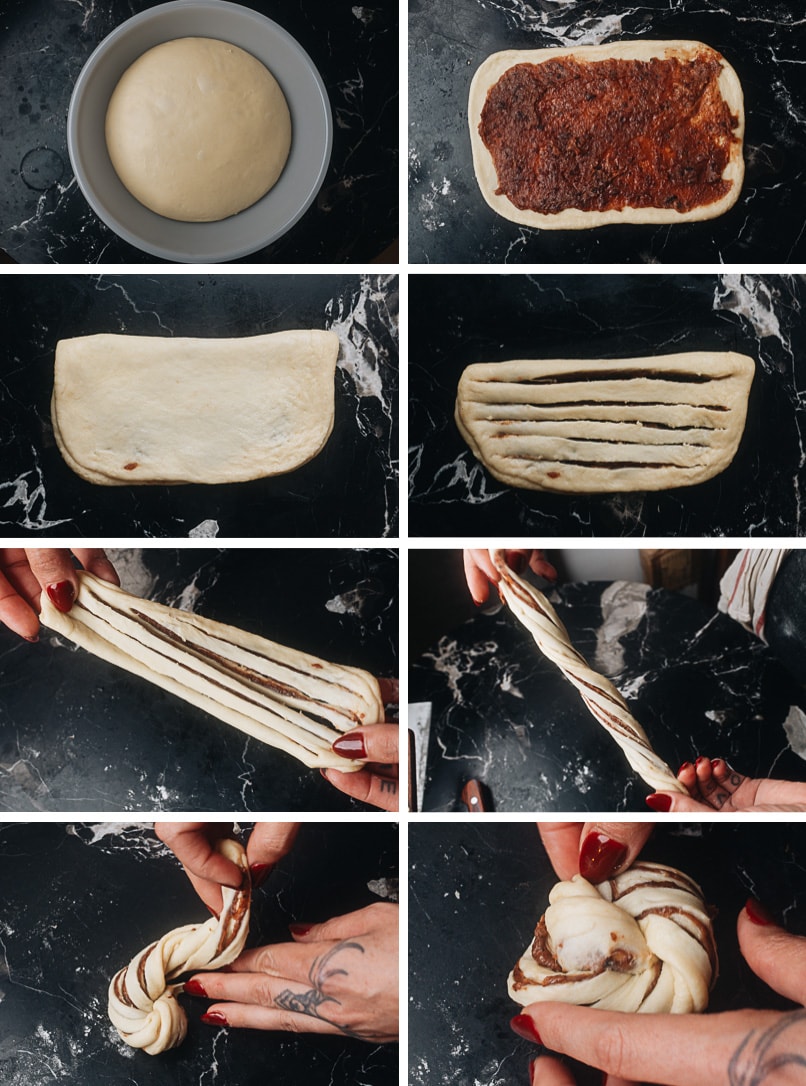
Bake the red bean bread
- Wait until the size of the buns doubles.
- Brush the buns with egg wash.
- Bake the buns until they are golden and fluffy.
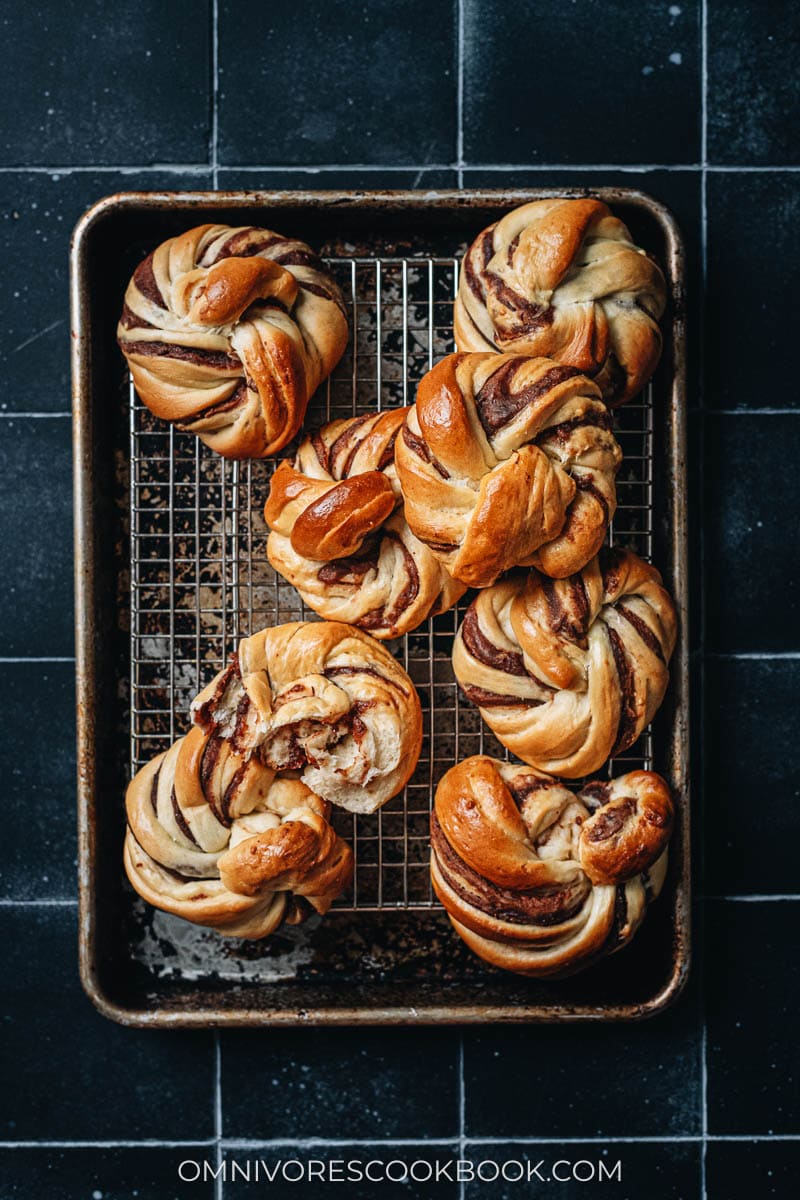
Shape the buns with a different method
The swirl-style red bean bread is beautiful and delicious. I really like the way that the red bean paste get toasted when it’s exposed.
However, this shaping method does take extra time. If you want a simpler approach, you can wrap the red bean paste inside of the bread.
In this case, the measurement of the dough pieces and the red bean paste should be the same in the recipe below. For the assembly part, you can refer to my baked char siu bread recipe (there are step-by-step pictures showing the shaping method).
How to store and reheat red bean bread
I love freshly baked red bean bread that is still warm. But these buns stay really well in the fridge and freezer, so you can store them and reheat them anytime.
If you plan to eat them within a day or two, you can store them in a ziplock bag in the fridge. Otherwise, I highly recommend storing them in the freezer to retain their moist and fluffy texture.
Once refrigerated or frozen, it’s always best to warm the bread at a low temperature in the oven, to bring back their texture.
This red bean bread is such a treat and they pair well with milk or a cup of hot tea. I hope you enjoy this one and happy baking!
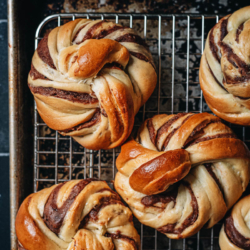
Red Bean Bread (豆沙包)
Learn how to make red bean bread like the ones from a Chinese bakery! The recipe uses an easy milk bread dough for a super soft and fluffy texture, and everything can be done with a mixer. {Vegetarian}
Ingredients
Dough
- 300 g (2 1/2 cups) bread flour
- 140 ml (1/2 cup) whole milk , and extra for brushing onto the bread
- 7 g (1 packet / 1 teaspoon) active dry yeast
- 30 g (2 1/2 tablespoons) sugar
- 5 g (1 teaspoon) salt
- 80 g (1/4 cup) sweetened condensed milk
- 4 tablespoons butter , melted
- 1 large egg
Egg wash
- 1 large egg
- 1 tablespoon heavy cream (or milk)
Instructions
1st rise
-
Add the milk into a small bowl and warm to approximately 100-110°F (38°C), about 30 seconds in the microwave. The milk should be warm, just a bit above body temperature. Add a pinch of sugar and the active dry yeast. Let sit for 5 minutes so the yeast will activate.
-
While the yeast activates, add the rest of the ingredients into your mixer bowl.
-
Once the yeast is activated, you should see bubbles on the surface of the mixture. Pour it into the mixer bowl. Mix with a spatula until the dough just comes together. Cover with plastic wrap and let rest for 20 minutes.
-
Install the dough hook on your mixer (I used a KitchenAid). Start at low speed, then gradually increase to setting 8 out of 10. Knead for 10 to 12 minutes, until the dough is very smooth. If the mixer is getting too hot, reduce the speed to 6. Stop the mixer in the middle and scrape the dough from the sides of the bowl. Test the dough by pulling a piece of it using both of your hands. It should stretch into a very thin and translucent sheet. The dough should be wet and a bit sticky.
-
Grease a big bowl with a thin layer of oil. Place the dough into the bowl. Cover with plastic wrap. Let rise until the dough doubles in size, about 1 hour.
2nd rise
-
Line a baking sheet with parchment paper.
-
Punch the air out of the dough (but do not knead it). Transfer it onto a lightly oiled working surface. Divide the dough into 11 even pieces, 55 g per dough. (*Footnote 1)
-
Shape the dough one piece at a time. Tuck the dough onto itself by pinching the dough from all sides into the center using your fingers, creating a round shape. Then roll the dough in a circular motion with your palm against the table, until it forms a round ball.
-
Sprinkle flour over the working surface. Work on one dough at a time. Roll the dough with a rolling pin into a 5”x7” (13 x 18 cm) rectangle sheet. Add a heaping tablespoon of the red bean paste, about 30 g, over the dough. Spread the paste into a thin layer, leaving about 1/2” gap on the edges. Fold the dough in half lengthwise. Gently pat the dough to remove any air bubbles. Then tightly press down the edges to seal. Cut 4 to 5 evenly spaced slits with a sharp knife lengthwise, about 1/2” apart. Hold the two short ends in your hand, stretch out the dough, and then twist it to form a spiral rope. Wrap up the rope on the working surface into a coil, then tuck the end underneath to seal the bread. Repeat with the rest of the dough.
-
Place the shaped bread on a lined baking sheet, 3” (7 cm) apart. Cover the baking pan with plastic wrap. Let rest again for another 35 to 45 minutes, until the size has doubled.
Bake the buns
-
Once the buns have finished their second rise, brush the edges gently with the egg wash. Bake at 375°F for 15 minutes, until golden brown. Once done, let the buns cool off a bit until you can handle them with your hands, then transfer to a cooling rack to cool.
-
Serve the buns warm or at room temperature.
Store and reheat
-
Once the buns have cooled off completely, place them in a ziplock bag or airtight container. Store in the refrigerator for up to 3 days, or in the freezer for up to 3 months.
-
To reheat the buns, you can either microwave them or bake them in a 300°F (148°C) oven until warmed throughout, 5 minutes for refrigerated buns or 10 to 15 minutes for frozen ones.
Notes
I found that 55 g dough makes the perfect size buns, and you will have a little dough left. If you do not use a scale, you can divide the dough into 10 pieces for bigger buns, or 12 pieces for smaller buns.
Nutrition
Serving: 1serving, Calories: 204kcal, Carbohydrates: 31.3g, Protein: 5.7g, Fat: 6g, Saturated Fat: 3.5g, Cholesterol: 31mg, Sodium: 210mg, Potassium: 88mg, Fiber: 0.8g, Sugar: 6.9g, Calcium: 41mg, Iron: 1mg

